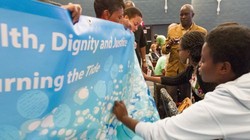The Interfaith Pre-Conference on HIV wrapped up 21 July with participants singing and pledging to do their part to “turn the tide” against HIV and AIDS.
Participants wrote ways they will take action to help end AIDS on a banner that will be displayed at the Global Village Faith Zone at the International AIDS Conference, which runs 22-27 July in Washington, DC.
Before completing the banner, participants heard from a panel on justice, where speakers discussed the ways injustice — such as poverty and gender inequality — hamper the HIV response.
The Rev. Dr. Nyambura Njoroge, program executive with the World Council of Churches (WCC), said that the epidemic is more than a medical issue.
“It is one where we are confronted by broken social relationships,” she said.
Faith groups must gather the courage to speak the truth and make human dignity the cornerstone in their work. In her work with the WCC, Njoroge has learned much from people living with HIV, who have told her that the stigma of the virus is more damaging than the virus itself.
“Without engaging people living with HIV, then we don’t have the facts,” she said. “Justice thrives in non-judgmental, non-stigmatizing, non-blaming communities.”
HIV ministries have encountered much loss and continue to suffer, Njoroge said. But churches have no exit strategy — they must continue working. And injustice is deeply entrenched within churches, which often use religion as a weapon against non-heterosexual people. The church must engage with and listen to communities affected by HIV, such as female sex workers. It must address injustice by asking new questions, such as who is buying the sex workers’ services?
‘We find ourselves being called upon the ministry of listening,” Njoroge said. “You have to learn how to listen together … reflect together.”
For Rosalee Velloso Ewell, executive director of the Theological Commission for the World Evangelical Alliance, justice and Christianity are inextricably linked.
The Bible mentions justice more than 800 times, and Christians affirm that Jesus gives abundant life to all.
“Justice is not something we can afford to give up,” she said.
Justice is also related to healing and to the idea of the body of Christ in all creation. Throughout the Bible, Jesus heals societal outsiders as an “indicator of God’s justice and turning of the tables.” Jesus accuses religious leaders of hypocrisy and is a voice for the voiceless.
“We must be together the voice of the voiceless, realizing that in doing so there will be destruction in the status of society and our own prejudices will be challenged,” Ewell said. “Working for justice isn’t optional, but is the call and responsibility of every Christian.”
Imam Johari Abdul-Malik, director of outreach at the Dar Al-Hijrah Islamic Center, said that HIV is more than a medical or social issue — it’s also related to “information injustice.”
The reliability about HIV status in Muslim countries is inadequate, he said. Many Muslim countries don’t report their HIV statistics, but the rate of HIV and AIDS is growing. Islam has high standards for chastity and sexual activity, but not all Muslims follow these rules. Yet the Muslim community is in denial.
“It’s a sin when you could do something about a situation and you fail to do it,” Abdul-Malik said.
Abdul-Malik spoke about a meeting he had with Iranian president Mahmoud Ahmadinejad, where he told the president that his words have power and that to deny there are gay people or people living with HIV in Iran shows he is out of touch with reality.
There are also gay men in Saudi Arabia and in Sudan, no matter what leaders there say, Abdul-Malik said.
Although the Koran states that women and men are equal, many Muslim countries still treat women as second-class citizens, using them as sex workers, he said.
The faith community needs to work for the common good, addressing injustice in order to help turn the tide against HIV, Abdul-Malik said.
Bethany Furkin is serving as co-opted staff for the Ecumenical Advocacy Alliance, covering the interfaith pre-conference to “AIDS 2012” ― the 19th biennial international AIDS conference and the first to be held in the United States in more than 20 years. More than 400 people of faith are attending the interfaith pre-conference, titled “Taking Action for Health, Dignity, and Justice.” The Ecumenical Advocacy Alliance is the lead international sponsor of the interfaith pre-conference, working in partnership with The Balm in Gilead as the lead national sponsor. Additional co-sponsors include INERELA+, Religions for Peace, Asian Interfaith Network on AIDS, Catholic Medical Mission Board and the American Jewish World Service.

